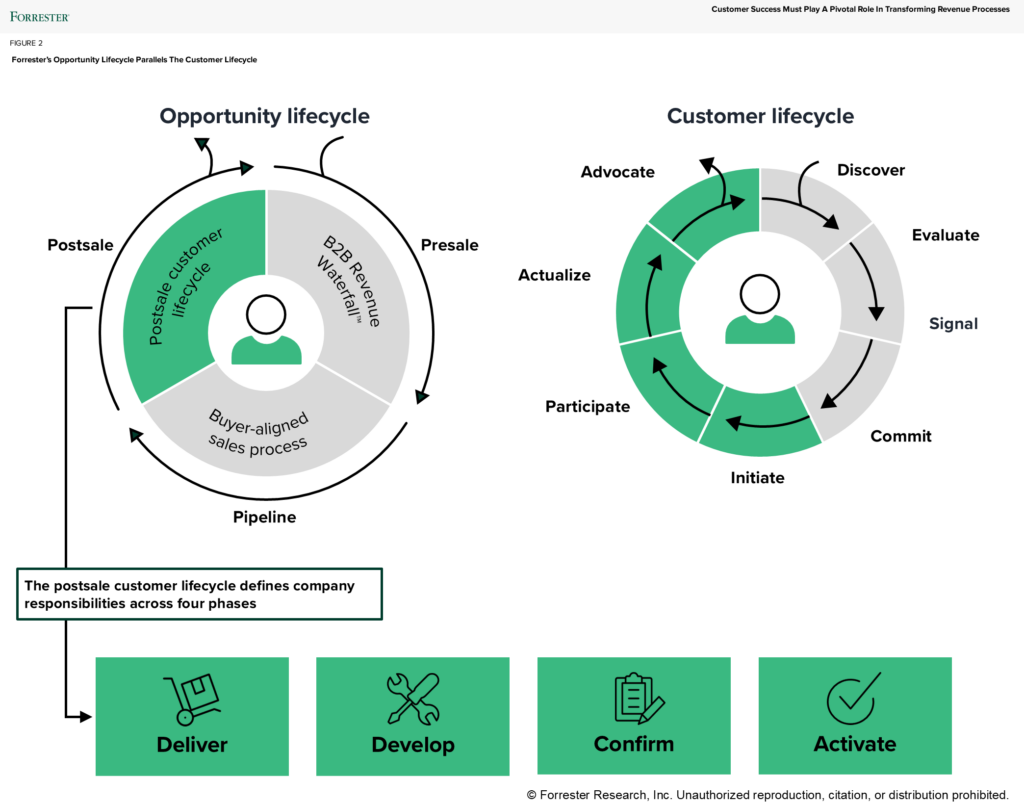Customer Success Plays A Crucial Role In Revenue Process Transformation
The Forrester Opportunity Lifecycle is a framework for transforming revenue processes to maximize value for B2B customers. As my colleague Amy Hawthorne explains, top revenue transformers:
- Share signals and create a common view of the customer — throughout the postsale. This is so you can achieve a true understanding of what makes customers succeed, as well as when they are deviating from or toward that goal.
- Adopt opportunities and retention/buying groups. Managing an opportunity (not just leads, marketing-qualified leads, or customer-success-qualified leads) is what vendors should do to support a customer’s journey from signed contract to loyal advocate. Retention groups are the postsale counterpart to the buying group — and they can become buying groups when expansion opportunities arise.
- Align marketing, sales, and customer success around shared, customer-centered goals and metrics. All frontline teams must play a coordinated, highly collaborative role in engaging customers. This ensures that customers achieve expected results faster and in more measurable, meaningful ways.
Customer Success’s Important Role
Customer success (CS) is uniquely positioned to help customers adopt offerings and achieve those meaningful results. Customer success managers enjoy close contact with customers, which puts them in touch with the signals and information that better inform customer understanding. They play a key role in all four postsale stages of the Forrester Opportunity Lifecycle framework, providing the management needed to guide customers to succeed. And when aligned with marketing and sales, they ensure that the business promises made during the presale and postsale stages turn into the results that customer expect — and more.

Four Steps Move Customers From Delivery To Activation
In a recently published report (subscription required), Forrester outlines the role of customer success in the opportunity lifecycle. Whether or not you have a distinct customer success function — or teams dedicated to account management, onboarding, training, retention, or value engineering — anyone responsible for supporting customers along their journey will help make your growth more predictable and increase customer longevity when they:
- Deliver: Set the stage for the customer’s success. Leading CS teams put goals and processes in place to formalize the transition from sales to postsale to make the customer experience more consistent. They document vital information about customer accounts and make it easily accessible across frontline teams, and they make customers step up to ensure their success.
- Develop: Ensure practical and meaningful offering adoption. To scale operations and generate measurable value, CS teams need to make sure that customers have at minimum a digital destination that gets them off to a fast start. This hub also becomes the place to connect with other customers, form a community, and elevate best practices across the customer ecosystem.
- Confirm: Help customers see that they’ve achieved a reasonable ROI. Top CS teams show they create value for customers when they help conquer the measurement obstacles presented by revenue process transformation, crystallize for customers the link between using their offerings and making measurable progress, and show the rest of the company that customers are really getting the results they want.
- Activate: Expand the relationship to reinforce loyalty. To turn happy customers into raving fans, CS teams help create community interactions that customers crave, show advocate customers appreciation through personally relevant experiences, and invite them to show off their achievements or report results that make leaders care.
Does Your Postsale Strategy Set Your Customers Up For Success?
Ensuring that customers get the value they want requires dedicated postsale resources. It’s time for customer success to earn the right to gain equal footing with marketing and sales along the journey to transformed revenue processes. To learn more, join us at Forrester’s B2B Summit North America from March 31–April 3 in Phoenix, where you can attend our workshop or sessions on customer success.
Forrester Decisions clients: You can access this report and related ones, or reach out to your account manager to schedule an inquiry or guidance session with an analyst, if you want to explore this topic further.
